Ever looked up at a neatly finished roof and admired the sharp line capping it off? That my friend, is the handiwork of a ridge cap, the crucial element shielding the peak of your roof from water infiltration and adding a touch of aesthetic flourish. But have you ever wondered how these ridge caps are formed? Enter the ridge cap machine, the unsung hero behind countless roofs.
This guide delves into the world of ridge cap machines, exploring their function, the different types available, their applications, and the nitty-gritty details like suppliers and pricing. We’ll also answer some frequently asked questions to ensure you have a complete understanding of these fascinating machines.
Function of Ridge Cap Machines
Imagine a long sheet of metal – like a blank canvas for your roof. A ridge cap machine takes this metal coil and, through a series of forming stations, bends and shapes it into the specific profile of a ridge cap. These stations consist of rollers with strategically designed grooves that progressively transform the flat metal into the desired shape.
Think of it like rolling out cookie dough and using cookie cutters to create fun shapes. The ridge cap machine is the rolling pin and the forming stations are your intricate cookie cutters, shaping the metal into the perfect ridge cap profile.
In essence, ridge cap machines automate the process of creating ridge caps, ensuring consistent quality, precise shapes, and increased production efficiency.
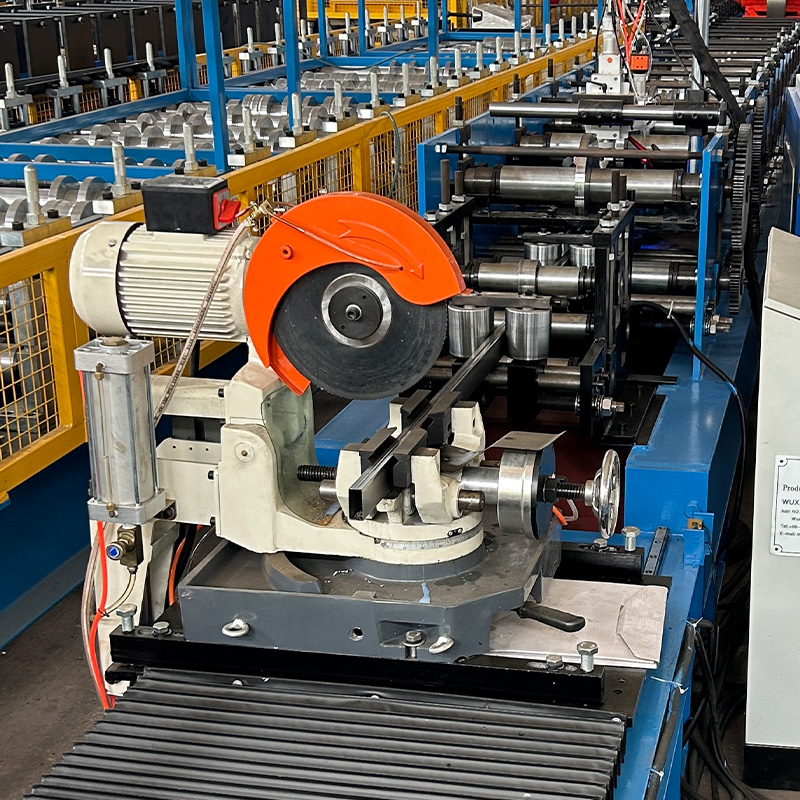
Types of Ridge Cap Machines
The world of ridge cap machines isn’t a one-size-fits-all scenario. Different machines cater to various needs, materials, and production volumes. Here’s a breakdown of the most common types:
- Roll Forming Ridge Cap Machines: These are the workhorses of the industry. They continuously feed metal coils through a series of rollers, progressively forming the desired ridge cap profile. Imagine a long, automated assembly line specifically for shaping metal.
- Hydraulic Ridge Cap Bending Machines: These machines utilize hydraulic pressure to bend pre-cut sheet metal into the desired ridge cap profile. Think of a powerful metal brake on steroids, precisely folding the metal with immense force.
- Manual Ridge Cap Bending Tools: While not technically machines, these handheld tools allow for on-site bending of ridge caps for small repairs or custom applications. Imagine a pair of heavy-duty pliers specifically designed for shaping metal roofing components.
Choosing the right type of ridge cap machine depends on factors like production volume, material type, desired ridge cap profile, and budget.
Here’s a table summarizing the function, types, applications, and other aspects of ridge cap machines:
| Feature | বর্ণনা |
|---|---|
| Function | Bends and shapes metal coils or sheets into various ridge cap profiles. |
| Types | * Roll Forming * Hydraulic Bending * Manual Bending Tools |
| অ্যাপ্লিকেশন | * Manufacturing ridge caps for residential and commercial roofing * On-site repairs and custom applications |
| উপাদান সামঞ্জস্যতা | Steel, Aluminum, Copper (depending on machine capabilities) |
| উৎপাদন ক্ষমতা | Roll Forming: High * Hydraulic Bending: Moderate * Manual Bending: Low |
| Advantages | Consistent quality, Precise shapes, Increased production efficiency (Roll Forming) |
| Disadvantages | Higher initial cost (Roll Forming), Limited flexibility (Hydraulic Bending), Manual effort required (Manual Bending Tools) |
By understanding these different types, you can select the ridge cap machine that best suits your specific needs.
Advantages of Ridge Cap Machines
There’s a reason why ridge cap machines have become an essential part of the roofing industry. Here’s a closer look at the benefits they offer:
- সামঞ্জস্যপূর্ণ গুণমান: Manual bending can lead to inconsistencies in shape and size. Ridge cap machines ensure every ridge cap produced is identical, guaranteeing a professional and uniform roof finish.
- Precise Shapes: The intricate forming stations of ridge cap machines allow for the creation of complex and precise ridge cap profiles, catering to various roof styles and architectural requirements.
- Increased Production Efficiency: Roll forming machines, in particular, can churn out ridge caps at a much faster pace compared to manual bending. This translates to quicker project completion times and increased profitability for roofing contractors.
- Reduced Labor Costs: With automation taking over the shaping process, the reliance on manual labor is significantly reduced. This can lead to cost savings for roofing companies.
- বহুমুখিতা: Many ridge cap machines can handle a variety of materials like steel, aluminum, and even copper (depending on the machine’s capabilities). This allows for flexibility in choosing the most suitable material for the project.
In short, ridge cap machines offer a winning combination of quality, efficiency, and versatility, making them invaluable tools for modern roofing projects.
-
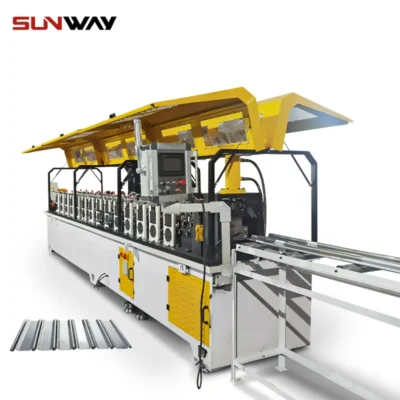 রোলিং শাটার স্ল্যাট রোল ফর্মিং মেশিন
রোলিং শাটার স্ল্যাট রোল ফর্মিং মেশিন -
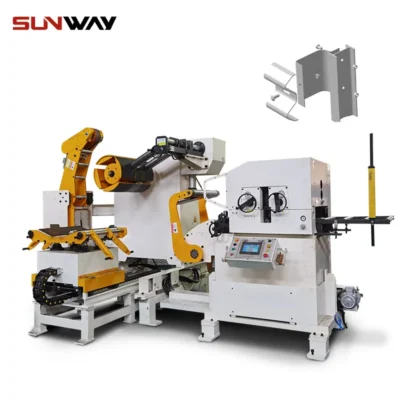 Highway Guardrail End Terminal Forming Machine
Highway Guardrail End Terminal Forming Machine -
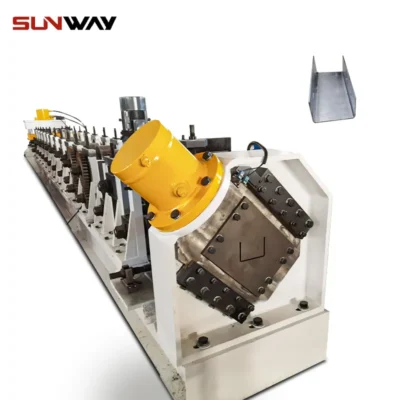 Highway U/C Post Roll Forming Machine
Highway U/C Post Roll Forming Machine -
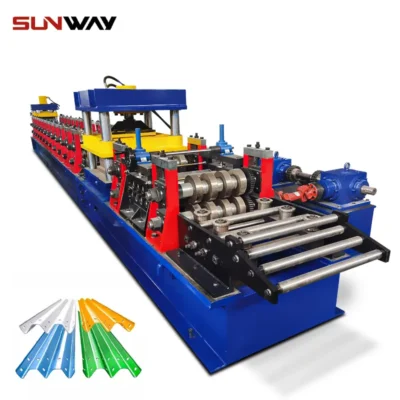 2 Waves Highway Guardrail Roll Forming Machine
2 Waves Highway Guardrail Roll Forming Machine -
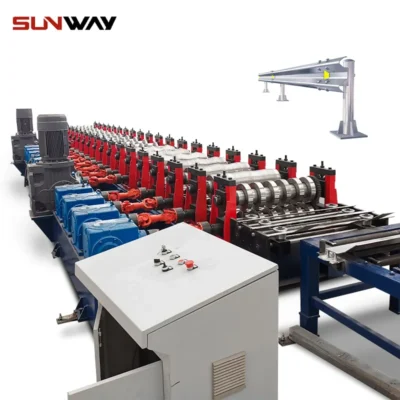 3 Waves Highway Guardrail Roll Forming Machine
3 Waves Highway Guardrail Roll Forming Machine -
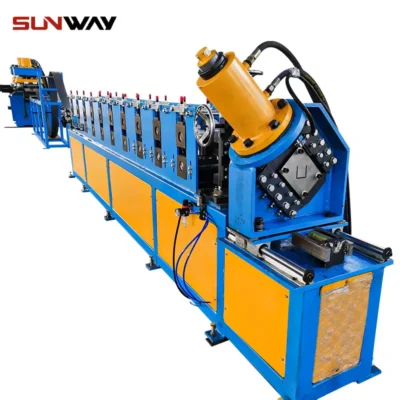 বৈদ্যুতিক মন্ত্রিসভা ফ্রেম রোল গঠনের মেশিন
বৈদ্যুতিক মন্ত্রিসভা ফ্রেম রোল গঠনের মেশিন -
 দিন রেল রোল ফর্মিং মেশিন
দিন রেল রোল ফর্মিং মেশিন -
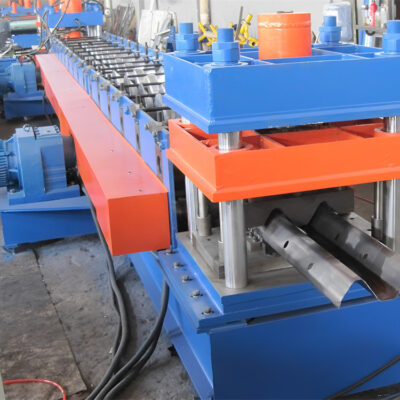 দুই তরঙ্গ হাইওয়ে গার্ডেল মেশিন
দুই তরঙ্গ হাইওয়ে গার্ডেল মেশিন -
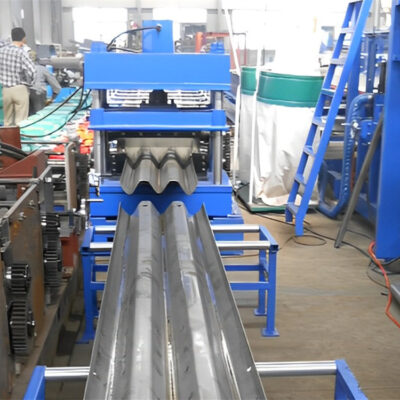 থ্রি ওয়েভ হাইওয়ে গার্ডেল মেশিন
থ্রি ওয়েভ হাইওয়ে গার্ডেল মেশিন
Disadvantages of Ridge Cap Machines
While ridge cap machines boast a plethora of advantages, it’s important to acknowledge some potential drawbacks:
- Higher Initial Cost: Roll forming machines, particularly those capable of handling a wider variety of profiles and materials, can come with a hefty price tag. This initial investment might be a hurdle for smaller roofing companies or those with limited project volumes.
- Limited Flexibility: While some roll forming machines offer the ability to create multiple ridge cap profiles, they typically require tool changes and adjustments. This can be time-consuming compared to hydraulic bending machines that can handle a wider range of profiles on the fly.
- Maintenance Requirements: Like any complex machinery, ridge cap machines require regular maintenance to ensure optimal performance and longevity. This includes replacing worn-out rollers, lubricating moving parts, and ensuring proper calibration.
- Skill and Expertise: Operating a ridge cap machine, particularly a roll forming machine, requires a certain level of skill and training. Improper operation can lead to production delays, material wastage, and even safety hazards.
- Space Requirements: Roll forming machines, especially those with high production capacities, can have a significant footprint. This necessitates adequate workshop space to accommodate the machine and its operation.
Weighing these disadvantages against the advantages is crucial when deciding if a ridge cap machine is the right fit for your needs.
Applications of Ridge Cap Machines
Ridge cap machines play a vital role in various roofing applications. Here are some key areas where they shine:
- Residential Roofing: The majority of ridge caps used in residential roofing are manufactured using roll forming machines. These machines produce a consistent flow of ridge caps in various profiles, catering to different architectural styles and roof pitches.
- Commercial Roofing: Commercial buildings often require larger and more complex ridge cap profiles. Ridge cap machines can efficiently produce these profiles, ensuring proper weatherproofing and a clean aesthetic finish for flat or low-slope commercial roofs.
- Metal Roofing: Metal roofs are becoming increasingly popular due to their durability and longevity. Ridge cap machines are instrumental in creating ridge caps specifically designed for metal roofing systems, ensuring a watertight seal and a sleek, finished look.
- Custom Applications: For unique roof designs or repair projects requiring specific ridge cap profiles, hydraulic bending machines or even manual bending tools can be valuable assets. These allow for on-site adjustments and the creation of custom ridge caps to meet the specific needs of the project.
In essence, ridge cap machines cater to a wide range of roofing applications, offering a solution for both residential and commercial projects, as well as metal and traditional roofing systems.
Suppliers and Pricing of Ridge Cap Machines
The market for ridge cap machines is populated by various manufacturers offering machines with diverse capabilities and price points. Here’s a glimpse into some of the key players and a general idea of pricing structures:
Suppliers:
- Haixing Machinery: A Chinese manufacturer known for their cost-effective roll forming machines for various roofing applications, including ridge caps.
- Lotos Forming: A prominent manufacturer offering a range of ridge cap roll forming machines, catering to diverse production needs and profile requirements.
- AG Torino Industrial Machinery: An Italian company specializing in high-end roll forming machines, known for their precision, durability, and ability to handle a wide range of materials.
- PBR Metal Fabrication: A US-based company offering various metal roofing equipment, including ridge cap bending machines and manual bending tools.
Pricing:
It’s important to understand that pricing for ridge cap machines can vary significantly depending on several factors:
- Machine Type: Roll forming machines generally have a higher price tag compared to hydraulic bending machines and manual bending tools.
- Production Capacity: Machines capable of higher production volumes typically come at a premium price.
- Material Compatibility: Machines that can handle a wider variety of materials like copper or thicker gauge steel might be more expensive.
- Brand and Reputation: Established brands with a proven track record of quality and performance may command higher prices.
As a general estimate, basic roll forming machines can start around $15,000, with high-end models reaching upwards of $100,000. Hydraulic bending machines typically fall within the $5,000 to $20,000 range, while manual bending tools are the most affordable option, starting around $100.
It’s crucial to obtain quotes from various suppliers and carefully consider your specific needs and budget before making a purchase.
Here’s a table providing a non-exhaustive list of suppliers and estimated price ranges for different types of ridge cap machines.
| Supplier | Machine Type | Estimated Price Range |
|---|---|---|
| Haixing Machinery | রোল গঠন | $15,000 – $50,000 |
| Lotos Forming | রোল গঠন | $25,000 – $75,000 |
| AG Torino Industrial Machinery | রোল গঠন | $50,000 – $100,000+ |
| PBR Metal Fabrication | Hydraulic Bending | $5,000 – $20,000 |
| Various Suppliers | Manual Bending Tools | $100 – $500 |
Remember, these are just ballpark figures. Always contact the manufacturers directly for the latest pricing and specific machine details.
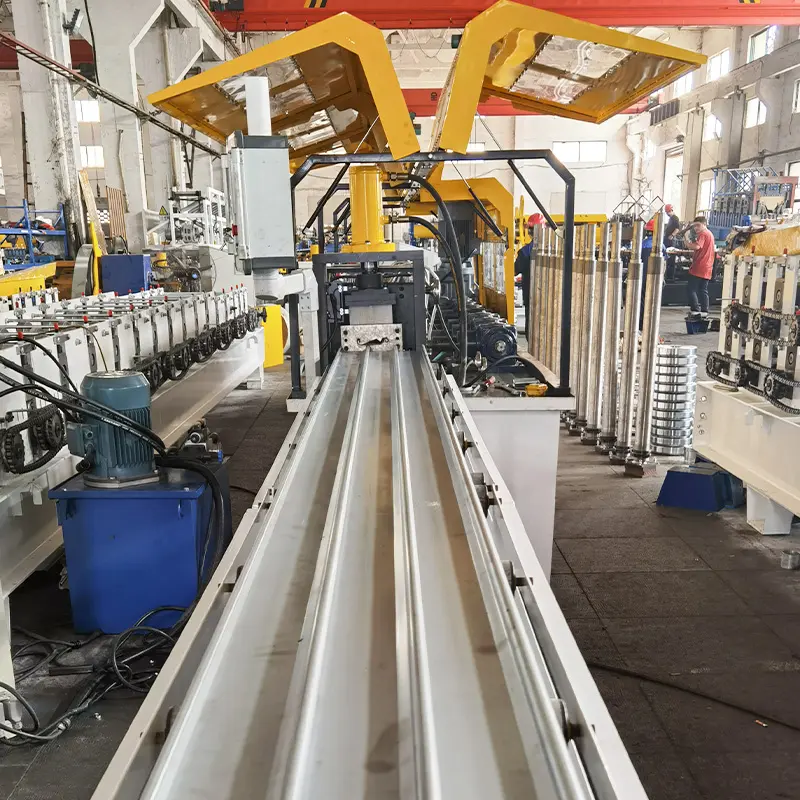
FAQ
Here are some frequently asked questions regarding ridge cap machines:
Q: What type of ridge cap machine is right for me?
This depends on your specific needs. Consider factors like production volume, material type, desired ridge cap profiles, and budget.
- For high-volume production of standard ridge caps, a roll forming machine is ideal.
- For lower volume projects or custom profiles, a hydraulic bending machine might be a better choice.
- For occasional repairs or on-site adjustments, manual bending tools offer a cost-effective solution.
Q: How easy is it to operate a ridge cap machine?
Operating a ridge cap machine, particularly a roll forming machine, requires a certain level of training and understanding of the mechanics. Most manufacturers provide training programs or instructional manuals to equip users with the necessary knowledge.
Q: How do I maintain a ridge cap machine?
Regular maintenance is crucial for optimal performance and longevity. This typically involves lubricating moving parts, inspecting and replacing worn-out rollers, and ensuring proper calibration. Refer to the manufacturer’s instructions for specific maintenance procedures.
Q: Can a ridge cap machine handle all types of metal?
The material compatibility of a ridge cap machine depends on its capabilities. Some machines can handle a variety of materials like steel, aluminum, and copper, while others might be limited to specific metals or thicknesses.
Q: Are there safety risks associated with operating a ridge cap machine?
As with any machinery, there are potential safety hazards when operating a ridge cap machine. Following proper safety protocols, wearing appropriate personal protective equipment (PPE), and adhering to the manufacturer’s guidelines are essential to minimize risks.
By understanding these FAQs, you can make informed decisions regarding ridge cap machines and ensure their safe and efficient operation.
উপসংহার
Ridge cap machines are the silent heroes behind countless roofs, ensuring a clean finish, weathertight protection, and a touch of aesthetic flair. From high-volume production lines to custom on-site repairs, these machines cater to a wide range of roofing needs. By understanding their functions, advantages, limitations, and the available options, you can determine if a ridge cap machine is the missing piece in your roofing operations puzzle.
